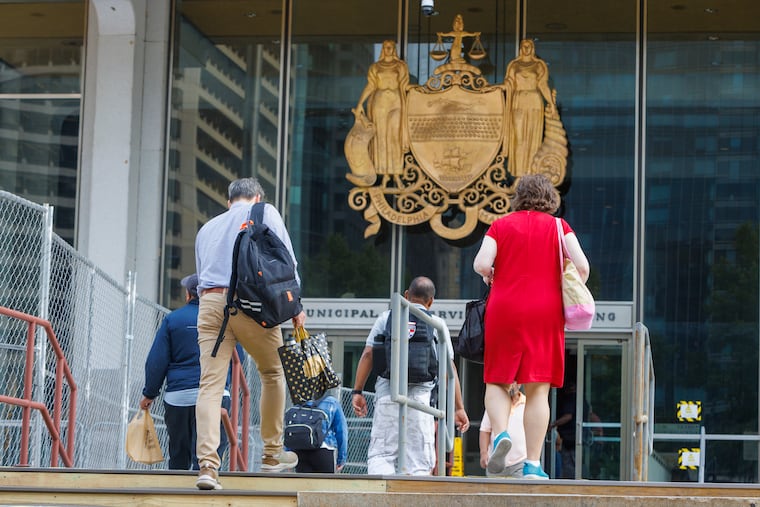All Philly city workers return to the office for the first time since 2020 under Mayor Parker’s new policy
The full return to office came after fierce opposition and discontent was heard Monday as employees entered the Municipal Services Building.

More than 25,000 Philadelphia city employees reported to work in person Monday, marking the first time the entire municipal workforce was required to work on-site full time since the coronavirus pandemic began in 2020.
It was a major moment for Mayor Cherelle L. Parker, a Democrat who took office in January and is now the only big city mayor in the Northeast to require all employees to work from the office five days a week. She has cast the return as a way to bolster the Center City economy and as a matter of equity given that thousands of city employees can’t work from home.
In an email to city workers Monday morning, Parker — who is out of town attending a leadership conference — said her administration is committed to facilitating “a well-run transition.”
“For some of you, this will mean making a change, and I know sometimes change doesn’t come easy,” she said in the email. “I strongly believe this change provides the opportunity for more personal and productive interactions, communication and collaboration.”
Parker added: “This change is essential for our city to grow and thrive and for Philadelphia to be better than ever before.”
The full return to office came after fierce opposition from the American Federation of State, County and Municipal Employees District Council 47, the union that represents about 3,700 mostly white-collar workers.
D.C. 47 sued the administration over the policy, saying the policy should have been collectively bargained and prompting a high-stakes legal challenge last week, just days before workers were scheduled to return.
But after a hearing last week, Common Pleas Court Judge Sierra L. Thomas-Street ruled that the Parker administration could impose the mandate and rejected the union’s lawsuit.
An unfair-labor practices complaint filed by the union remains pending.
Parker’s spokesperson Joe Grace said the administration took a variety of steps to ease the transition, including collaborating with Center City restaurants and businesses to offer discounts to city employees on meals and other purchases.
The Commerce Department worked with the Pennsylvania Restaurant and Lodging Association to facilitate the offerings for workers, which range from 25% off their check at Cavanaugh’s Rittenhouse to VIP passes for a happy hour show at Chris’ Jazz Café.
» READ MORE: Other Northeast U.S. cities have brought municipal workers back to the office. Just not every day like Philly.
City workers were also treated to free Chickie’s & Pete’s crabfries on Monday — by shortly after 11 a.m., a line from the food truck near City Hall stretched more than 100 yards.
Still, under the surface, there remained discontent among a contingent of city workers who oppose the return-to-office mandate. More than a dozen employees who declined an interview with The Inquirer as they entered the office Monday said they were not happy to return in-person on a full-time basis.
Alvonia Smith, whose work primarily revolves around reviewing deeds, said she has worked from home at least part time at various jobs for 30 years. She said she applied for her current job last fall because it was offered as a hybrid position, and she said she is “more effective at home” because working in the office can be distracting.
Now, Smith, of Brewerytown, is back in the office full time.
“I hate [the new policy],” Smith, 68, said. “I wish [Parker] wasn’t so small-minded.”
Another city employee, who requested anonymity because he feared retaliation, said he has been working in the city’s procurement department for three decades and is “not happy” about the new policy. He cited his commute from Fox Chase as the primary reason for the inconvenience, saying that he relies on public transit and that trains are often late.
The 61-year-old said he thinks the policy will engender resentment toward the mayor.
“I just feel like we’re a bunch of pawns being used,” he said. “It was never about the work getting done. It was just about being here.”